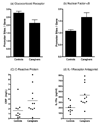A functional genomic fingerprint of chronic stress in humans: blunted glucocorticoid and increased NF-kappaB signaling
- PMID: 18440494
- PMCID: PMC2581622
- DOI: 10.1016/j.biopsych.2008.03.017
A functional genomic fingerprint of chronic stress in humans: blunted glucocorticoid and increased NF-kappaB signaling
Abstract
Background: Chronic stressors are known to increase vulnerability to medical illness, but the mechanisms underlying this phenomenon are poorly understood.
Methods: To identify transcriptional control pathways that are modified by chronic stress, we conducted genomewide expression microarrays on familial caregivers of brain-cancer patients (n = 11) and matched control subjects (n = 10). Analyses were conducted on peripheral blood monocytes, which are cells that have the ability to initiate and maintain many inflammatory responses. Salivary cortisol was collected over the course of 3 days as volunteers went about normal activities.
Results: Caregivers' patterns of cortisol secretion were similar to those of matched control subjects. However, their monocytes showed diminished expression of transcripts bearing response elements for glucocorticoids, and heightened expression of transcripts with response elements for NF-kappaB, a key pro-inflammatory transcription factor. Caregivers also showed relative elevations in the inflammatory markers C-reactive protein and interleukin-1 receptor antagonist.
Conclusions: These findings suggest that even in the absence of excess adrenocortical output, stress brings about functional resistance to glucocorticoids in monocytes, which enables activation of pro-inflammatory transcription control pathways. This persistent activation of inflammatory mechanisms may contribute to stress-related morbidity and mortality.
Conflict of interest statement
None of the authors has a biomedical financial interest or a conflict of interest to declare related to this project.
Figures




Comment in
-
Inflammation versus glucocorticoids as purveyors of pathology during stress: have we reached the tipping point?Biol Psychiatry. 2008 Aug 15;64(4):263-5. doi: 10.1016/j.biopsych.2008.05.018. Biol Psychiatry. 2008. PMID: 18675617 Free PMC article. No abstract available.
References
-
- Cohen S, Janicki-Deverts DL, Miller GE. Psychological stress and disease. JAMA. 2007;298:1685–1687. - PubMed
-
- Cohen S, Tyrrell DA, Smith AP. Psychological stress and susceptibility to the common cold. N Engl J Med. 1991;325:606–612. - PubMed
-
- Dong M, Giles WH, Felitti VJ, Dube SR, Williams JE, Chapman DP, et al. Insights into causal pathways for ischemic heart disease: Adverse childhood experiences study. Circulation. 2004;110:1761–1766. - PubMed
-
- Matthews K, Gump BB. Chronic work stress and marital dissolution increase risk of posttrial mortality in men from the Multiple Risk Factor Intervention Trial. Arch Inter Med. 2002;162:309–315. - PubMed
Publication types
MeSH terms
Substances
Grants and funding
LinkOut - more resources
Full Text Sources
Other Literature Sources
Medical
Molecular Biology Databases
Research Materials

